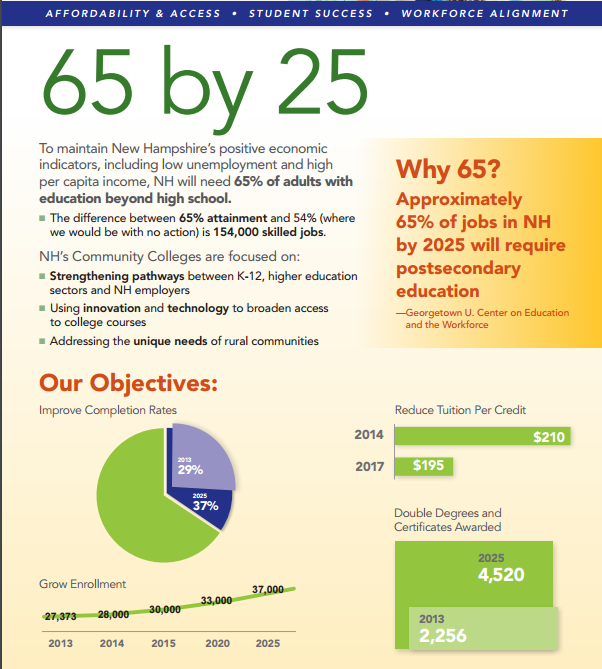
New Perkins “Q and A” Guidance from the Federal Department of Education
Earlier this month, the federal Department of Education (ED) released a new set of responses to frequently asked questions regarding the implementation of the Perkins Act. Three new questions were included in the new set (Version 5.0), including information on academic courses, school-based businesses and equity activities. The specific new questions are listed below, and answers can be found beginning on page 46 of the compiled Q and As.
- May Perkins IV funds be used to pay for the costs of academic courses in secondary schools?
- What is program income?
- May Perkins IV subrecipients earn program income?
- Does earning program income impact the Perkins IV allocation subgrantees receive from the State under sections 131 and 132 of Perkins IV?
- What are State agencies’ responsibilities under the Methods of Administration (MOA) program and may Perkins IV funds be used to pay for the costs of conducting the activities required under the MOA program?
It is important to note that the new answers serve as non-regulatory guidance, that while classified as “significant,” is non-binding and is not designed to create or impose new legal requirements.

NH CTE Working Towards 65 X 25

FFA State Officers Visit New Commercial Facility
The FFA State Officers recently had the opportunity to visit Lëf Farms, a new 75,000 square foot, multi-million dollar production facility in Loudon. The operation, owned by Pleasant View Gardens, is expected to hydroponically produce 1.3 million pounds of fresh greens each year. With their state-of-the-art computerized system, harvest to table time is 24 hours. The State Officers were able to chat with Henry Huntington, co-owner, about the bright future for this commercial agriculture venture.

New chapter marks unprecedented collaboration for NCDA
At the end of June, the National Career Development Association (NCDA) announced the formation of the Vermont/New Hampshire Career Development Association (VT/NH CDA).
According to Doug Cullen, who was voted founding president of the chapter by NCDA membership, it is the first time two states have ever collaborated within one chapter.
“There was actually a by-law change voted in by members at this year’s national convention in Chicago to even allow such a non-profit creation to occur,” he noted. “We are literally making history in its creation.”
NCDA Executive Director Deneen Pennington referred to the new chapter as “an important addition to NCDA’s state presence and voice in the New England area.”
“State divisions deliver significant services to the membership, help identify the leadership of the future, and provide essential feedback to NCDA,” Pennington noted. “This vibrant new division will help to establish and improve the standards for professional service in the field of career development in those respective states.”
VT/NH CDA liaison to NCDA, NCDA Trustee Wendy LaBenne said the new state division will provide career practitioners with meaningful opportunities to connect with others in the field and hold professional development events at a state level.
“The state division will also provide a platform for those interested in building leadership skills an avenue at the state level,” she said. “We look for all state divisions to promote career development in their state as well as provide leaders for consideration at the national level.”
Citing his belief that VT/NH CDA will help to endorse “the incorporation of theory and effective practice models into career development services” across both states, Cullen said his vision also includes greater bridge-building efforts between Canada and international NCDA affiliates.
“Given declining populations in both states, understanding best practices involving people from different cultures may assist career development practitioners working with a potential increase in students and clients coming to northern New England or being intentionally recruited by Vermont and New Hampshire industries from different nations,” he said.
As an initial step for the new chapter, Cullen expressed enthusiasm for its first official Chapter Networking Session as part of the Tri-State CTE Director’s Conference on July 29 in Burlington, VT. At the conference, Dick Knowdell, well known for his work with the Career Values Card Sort, Motivated Skills Card Sort, Occupational Interest Card Sort and the Leisure/Retirement Activities Card Sort that began in 1977, will speak about recent changes in the Career Development industry.
“It will provide new and existing practitioners with a perspective on how their jobs and the students/clients they support have changed and potentially how to adapt to those changes to be most effective,” he said.
According to Cullen, though, the formation of the VT/NH CDA is just one of many “exciting developments” in the industry that he feels could benefit CTE participants in the long term. One such development relates to a formal partnership between NCDA and the Association for Career and Technical Education (ACTE).
“I feel ACTE alignment may enable greater CTE association involvement by CTE faculty/staff looking for more national and international exposure/best practices,” he said. “It may provide the most engaged CTE staff with a greater opportunity to interact with a broader and deeper set of CTE professionals as well as broadening and deepening the depth of CTE curriculum and student experiences in New Hampshire.”
Pennington also express optimism at the partnership, as she said both organizations serve “separate, yet overlapping constituencies with a similar focus related to career development priorities and support of practitioners in the field.”
“This partnership provides the basis for a formal collaboration between the two organizations that is be mutually beneficial,” she added. “Benefits include membership collaboration, professional development opportunities, and joint marketing efforts. The benefits to the local CTE stakeholders include access to all NCDA research, advocacy, professional development, and career resources at reduced membership rates.”
For more information about VT/NH CDA or the upcoming Tri-State Conference, visit www.vtnh-cda.org. To learn more about the NCDA, visit https://ncda.org.
This is the first part of a three-story series where we look at the recent formation of a new chapter of the National Career Development Association and related issues.

Staying ‘nimble’ the key to CTE programming
Offered since the 1970’s, CTE programs at the Career Technical Education Center at Portsmouth High School are thriving, according to Career Technical Education Director Diane Canada. Averaging approximately 200 students annually, Portsmouth will offer seven programs in school year 2016-17, which include: Education & Teacher Training, Entrepreneurship, Culinary Arts, Construction Trades, Architecture & Engineering Design, Welding Technology and Automotive Technology.
Down one program from last year, Portsmouth will no longer offer Hospitality Management, however, as leadership elected to close it with enrollment numbers less than sufficient to justify its continuance. In the program, students spent one class period each week learning the different areas of hotel operations at the Sheraton Portsmouth Hotel. Such a closure, though, is not a negative development, but rather the result of the generally “nimble” nature of CTE programming itself.
“In the ten years I have been director, I have had to make changes to programming to meet the needs of the community and the interests of the students,” said Canada. “I have closed programs, cut them to half time, and put some on hold to determine whether to rebuild or close. I have increased programs and added new ones as well. I am continually shifting to keep our programming relevant to our students.”
As for what influences enrollment numbers for any particular program, she cited many factors, including economics, demographics, and perceptions regarding up and coming careers.
“Portsmouth is an affluent community where the vast majority of our students go on to four-year colleges,” she added.
Looking ahead
In looking to the next academic school year, Canada expressed enthusiasm regarding the direction of their CTE programs, including Entrepreneurship, which was just granted two-year approval from the NHDOE Career Development Bureau.
“I have two teachers for this one program and all classes are filled,” she said. “These students compete in the UNH BizGen competition as well as in their own in-house business plan competition that is fully supported by the Seacoast Rotary Club.”
Education & Teacher Training is another program that tends to attract many students, who become extremely active in Family, Career and Community Leaders of America, a nonprofit national career and technical student organization program. Canada said these same students also intend to become quite active in Educators Rising, which provides young people with hands-on teaching experience, and help them develop the skills needed to become successful educators.
“Culinary Arts is also very popular in this restaurant town,” she said. “Our students compete very successfully at state and national levels. One student just returned from his second national competition in SkillsUSA.
In addition to expanding the footprint of current CTE programming, Canada said they are considering two new program areas.
“We are working very closely with Great Bay Community College to bring about a Computer Science Pathway,” she said. “This coming year, we will offer two courses that will be taught by GBCC faculty here in the high school as well as two courses offered in our blended learning lab through eStart. I am also partnering with a local nursing home, the Edgewood Centre, to offer an LNA Certification class. I am hoping to eventually offer more healthcare courses…This is an exciting time for our program and CTE statewide.”

Plymouth Applied Technology Center
Location: Plymouth, NH
Director: Randy Cleary
Website: www.PRHS.sau48.org

Cheshire Career Center
Location: Keene, NH
Director: Lisa Danley
Website: www.CheshireCareerCenter.org

Dover Career Technical Center
Location: Dover, NH
Director: Louise Paradis
Website: www.CTC.Dover.k12.nh.us

Students Think Outside the Box at BizGen
Organized by BizGen, whose mission “is to light the spark in the next generation of business developers,” BizGen is a business competition hosted at UNH designed to inspire students to think like an entrepreneur.
Noting it is still in its infancy stage as a competition, Tiffany D’Amour, Business Educator at Portsmouth High School, referred to this year’s BizGen as “stellar.” “Judges were critical and treated the students as if they were true entrepreneurs,” she said. “These judges were comprised of business professionals and angel investors, who are similar to venture capitalists.”
At this year’s competition in late May, Portsmouth High School teams placed 3rd and 4th with prize money for the students of $1,000 and $500 in total, respectively. Awards were provided to the top 4 business ventures out of 18 teams who entered.
D’Amour praised both teams for their hard work, which began with creating and submitting a 1-page abstract that highlighted their business idea, critical areas needed for success, and the target market. The teams then wrote a 10-page business outline and provided a business presentation pitch to a panel of judges.
The 3rd place team, BookBit, was a business venture whose goal was to capture 65% of college students who do not purchase college textbooks. BookBit provided a digital textbook where students could purchase pages of a textbook versus having to make a large upfront payment for the entire textbook.
The 4th place team, Just in Case, was a business venture based on improving the response time of local police to sexual assault or domestic abuse victims. The company offered a cell phone case where the user could slide and click on a button on the side of the cell phone case that immediately configured his/her GPS location and then directly connect with local law enforcement.
“There is no prototype as of right now for either business, but the students learn the entrepreneurial process with this idea,” D’Amour said.
In Portsmouth, she said BizGen has also garnered interest from outside the Business CTE program.
“For the last 2 years, there has been a team that competed and they were hockey players who met before practice to compete,” she added.
Aside from the value of the experience in the competition itself, D’Amour said she believes students gain skills for the long, term, too. “They learn confidence, speaking skills, thinking on their feet, how to keep calm in a high pressure environment and how to network—all critical skills in the business world and life,” she said.
Katie Auger, who was on the 4th place winner and plans to attend UNH Paul College in the fall, said her BizGen experience was unique, as it helped her “learn about myself and discover another part of the business world.”
“It pushes students to discover interests and talents they never knew they had as well as test their creativity,” she said. “It was an incredible event that challenges students to think outside the box.”
D’Amour also expressed enthusiasm regarding the future of BizGen.
“Ken Johnson, one of the founders, works at F.I.R.S.T, which is a robotics STEM company and he believes in the hands-on approach of teaching and inspiring students to be creative in the classroom,” she said. “It is a local competition with a goal to expand nationally.
To learn more about BizGen as an organization and its various initiatives, visit Biz-Gen.org.

